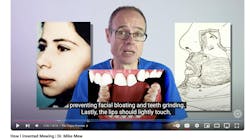Good oral hygiene habits key to battle against periodontal disease
People who practice good oral hygiene may be doing more for themselves than creating and insuring beautiful smiles, says one of the country's leading periodontists.
They could also be lowering their risks for heart disease, strokes and diabetes and decreasing women's chances of delivering pre-term or low-birth weight babies, said Dr. Robert Holt, a periodontist with the Florida Institute for Periodontics & Dental Implants, which provides consulting services for the U.S. Army, the Cleveland Clinic and several universities.
"In the past, periodontal disease was just considered a mouth infection," Holt said. "But it's not just a mouth infection anymore. Researchers have discovered correlations between periodontal disease and chronic medical conditions. Now, more than ever, people have solid reasons for taking care of their teeth and gums."
Periodontal disease, commonly known as gum disease, affects the majority of American adults. According to the American Dental Hygienists' Association, 75 percent of adults have some degree of gum disease, which is the leading cause of adult tooth loss in the country.
But many can avoid the ravages of periodontal disease -- a chronic bacterial infection that causes the destruction of the bones and gums that support the teeth.
"The most important thing in the whole equation is what the patient does for himself," Holt emphasized.
Several steps can be taken to prevent periodontal disease:
* Good oral hygiene habits should begin early in life. "With periodontal disease, the damage accumulates over a lifetime," Holt said. "If you develop good oral hygiene habits early on, you may be spared most of the problems of this disease."
* Proper brushing and flossing are extremely important in preventing periodontal disease.
* Twice a year visits to the dentist are not only important in staving off the disease but also in catching the early warning signs if the disease develops.
* Those who smoke should stop. Tobacco users are at increased risk for periodontal disease. Recent studies have shown tobacco use may be one of the most significant risk factors in the development and progression of periodontal disease.
* Proper nutrition is key in preventing periodontal disease. A diet low in important nutrients can compromise the body's immune system, making it harder for the body to fight off infection. Poor nutrition can worsen the condition of gums.
If caught early, periodontal disease is curable. The early warning signs for periodontal disease include swollen, red or bleeding gums, tooth sensitivity and bad breath.
"In the early stages, it can be reversed and controlled," said Holt, co- author of the textbook Periodontal and Prosthetic Management of the Advanced Cases. "Early treatment is very effective."
However, many Americans develop advanced stages of the disease, which leads to tooth loss. At least 113 million Americans are missing one or more teeth, according to the National Institutes of Health. For those Americans, dental implants have become their solution for permanent tooth replacement.
Holt along with Drs. Jeffrey Ganeles and Marvin Rosenberg at the Florida Institute for Periodontics & Dental Implants conducted a landmark study establishing a revolutionary dental implant procedure that delivers fixed replacement teeth in 24 hours. The remarkable success of the study, which had a 99.5 percent success rate and was published in the peer-reviewed International Journal of Oral & Maxillofacial Implants, placed 186 dental implants in 27 patients over a period of four and a half years.
More information on periodontal disease and dental implants can be found at www.perio-implant.com.





